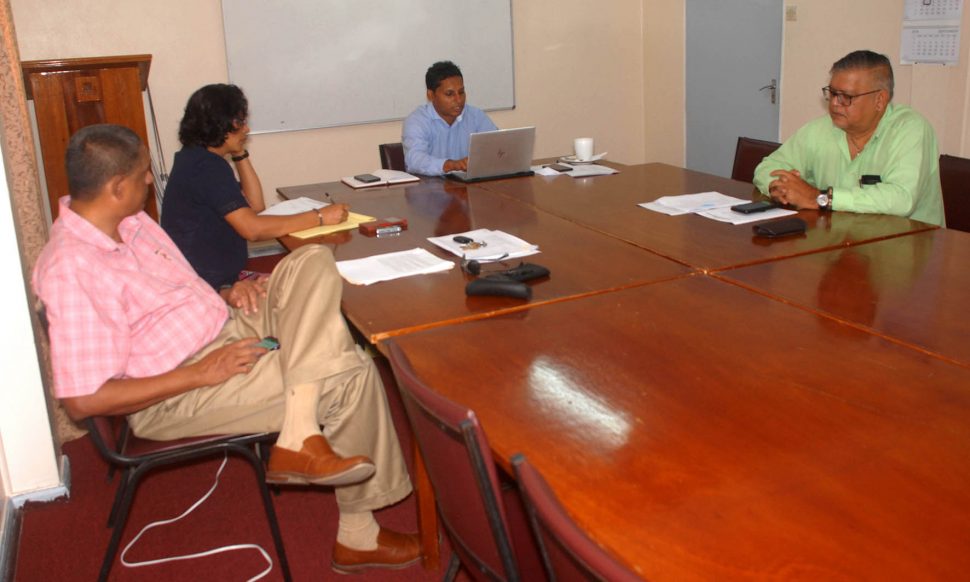What has now metamorphosed into a protracted public/private engagement involving key government ministers and senior officials of the Guyana Manufacturing & Services Association (GMSA) may be moving at a leisurely pace but the private sector officials facing key government officials across the table say that the importance of keeping doors open to ensuring the growth of the manufacturing sector dictates that the two sides remain engaged.
On Tuesday, Stabroek Business was invited to attend a briefing on the discourses ensuing within the framework of the Ministerial Round Table by three of the GMSA’s key participants at the discourse, the Association’s President Shyam Nokta, its immediate past president Ramsay Ali and long-standing Executive Member Ramesh Dookhoo.
It is the agro-processing sector that is now frontally engaging the attention of the two sides and when account is taken of the weighty nature of the agenda the best that can perhaps be said is that the two sides, having now been engaged for several months are likely to be talking for a good deal longer.
A key issue on the list of fourteen agro-processing-related items on the roundtable’s agenda is the GMSA’s proposal that government establish a modular agro processing facility to process local fruit and vegetables customarily cultivated on a large scale, including mango, pineapple, plantain and peanut. The GMSA, says that it is prepared to facilitate the sourcing and installing of the equipment and says that such a facility is likely to create stable and guaranteed markets for farmers that will not only have a knock-on effect on productivity and lower production costs but will also be a key step towards servicing export markets.
Other issues on the agenda which the GMSA says are pivotal to the creation of a robust agro-processing sector include the prevailing tax regime and its impact on the viability of the sector, electricity, financing for small agro processors, technology, market access and trade barriers. The GMSA is seeking the reduction of Corporation Tax to 25%, the removal of excise taxes on fuel utilized in the manufacturing sector, the granting of tax rebates to companies utilizing alternative energy and the reinstatement of zero-rated status for agro-processed exports. Additionally, the GMSA is seeking to make a case to the Round Table forum for the removal of VAT on electricity, the provision of dedicated electricity supply feeders to industrial areas in order to ensure stable and reliable power, the reduction of taxes on diesel and fuel oil, the granting of incentives for renewable options and the acceleration of initiatives designed to enable overall improvements to the national electricity grid. The GMSA says that it is prepared to support these initiatives by encouraging its members to embrace energy efficiency and renewable energy technologies.
Meanwhile, the GMSA is also hoping that the talks with government will yield a national policy on agriculture and agro-processing that will provide clarity on the direction, priorities and incentives that can be expected from government to the sector. The GMSA, its officials say, is prepared to work to bring to government’s attention the key issues facing agro processors and to help identify solutions.
Talks with government are also aimed at helping to improve the competitiveness and product quality of small agro processors by pushing for more financing through the Small Business Bureau (SBB) and other agencies as well as support with the mentoring of those fledgling establishments.
And in order to provide direct support for the local agro processing sector the GMSA says it wants government agencies themselves to preferentially source items from local agro processors once these products are available and of the requisite quality. In support of this development the GMSA wants government to hasten the implementation in the Small Business Act that enables the allocation of 20% of government acquisitions to the small business sector.
Meanwhile, the GMSA has also tagged the speeding of efforts towards the enactment of a Food Safety Bill as critical to the acceleration of growth in the agro-processing sector. However, it says that movement towards enactment of legislation must be preceded by further stakeholder consultation prior to passage in the National Assembly.
Also on the agenda for the ongoing talks are the creation of a national policy for agriculture and agro-processing which the GMSA says will provide a greater measure of clarity on the direction, priorities and incentives on offer to the agro-processing sector by government.
Other issues which the GMSA says are being pursued as part of the roundtable agenda are the establishment of a facility for small processors that will enable the proper packaging of their agro-processed products.
Meanwhile, the GMSA says that state-run agencies have key roles to play in the overall process. The GMSA is calling for the urgent institutional strengthening of the Government Analyst Food and Drug Department (GAFDD) and is urging that the Guyana National Bureau of Standards (GNBS) develop further standards. Meanwhile, the private sector body wants the Guyana Revenue Authority to expedite and simplify the clearance of goods including the use of electronic entries and wants the Guyana Office for Investment (GO-Invest) to provide a “greater push” in support of agro- processing through more “hand-holding.”










